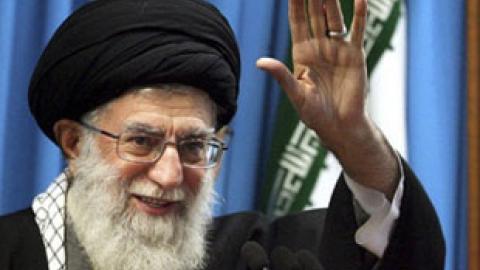
Iran's Khamenei Denies Nuclear Weapons Ambitions
JERUSALEM, Israel -- Iranian leaders continue to insist their nuclear program is strictly for peaceful use but their behavior often belies their explanations.
This past week, Tehran hosted heads of state and delegations from 120 nations at the Non-Aligned Movement's summit, where it accepted the presidency for a three-year rotation.
Iranian leaders said the gathering proved that harsh economic sanctions have failed to isolate it from the international community.
At the summit, Supreme Leader Ayatollah Ali Khamenei said Iran's nuclear aspirations are solely for energy production and not nuclear weapons.
"Our motto is nuclear energy for all and nuclear weapons for none," he said.
Khomenei also took the opportunity to accuse "the usurping Zionist regime" of killing, torturing, and arresting Palestinian Arabs and destroying their homes.
"Even now after 65 years, the same kind of crimes marks the treatment of Palestinians remaining in the occupied territories of the ferocious Zionist wolves Hardly a day passes without reports of murder, injury, and arrests of youth who stand up to defend their homeland," he claimed.
**Click here to read his full speech, posted by David Icke.
Iranian President Mahmoud Ahmadinejad met with Palestinian Authority leader Mahmoud Abbas on the sidelines of the summit and extended an invitation to hold unity talks with Hamas.
"You and the rest of the Palestinian brothers are always invited to Iran to discuss unity. We love all Palestinians. Iran is committed to Palestinian unity," he said, according to YNet.
"The Islamic Republic of Iran is the only country that has never recognized the Zionist regime and it believes that the Zionists are occupiers who kill the Palestinians by imposing their presence in the region," Ahmadinejad said.
Doubled Number of Centrifuges
Meanwhile, in its quarterly report issued on Thursday, the International Atomic Energy Agency said Iran has doubled the number of centrifuges used to enrich uranium at its underground Fordow facility near Qom.
The IAEA also reported that buildings at the Parchin military complex had been destroyed and "earth removed."
One building, believed to house a steel chamber for testing explosives, had been "shrouded." Iran has not allowed IAEA inspectors access to the site.
Iranian leaders rejected the report as politically motivated.
U.N. Secretary-General Ban Ki-Moon, who attended the summit despite U.S. and Israeli objections, took issue with some of Khamenei's Israel bashing, advising him to tone it down.
He also said Iran should prove its peaceful nuclear intentions to the world.
Morsi Gets Red Carpet Welcome
Egypt's newly installed Islamist President Mohammed Morsi received a red-carpet welcome in the first state visit by an Egyptian leader since the 1979 Iranian revolution -- the same year Egypt became the first Arab nation to sign a peace treaty with Israel.
But Morsi's criticism of Syrian President Bashar al-Assad's "oppressive" regime, which prompted the Syrian delegation to walk out, also angered the Iranians, who support Assad.
According to several reports, Iranian media altered Morsi's remarks to reflect a pro-Syrian stance.
President Obama has invited Morsi to meet with him on the sidelines of the U.N. General Assembly meeting in New York in September.
Gen. Dempsey: Israel Living with 'Existential Concern'
While all this was going on, Gen. Martin Dempsey, chairman of the Joint Chiefs of Staff, told reporters on the sidelines of the Paralympic Games in London, that he would not want to be "complicit" in a pre-emptive Israeli strike on Iran's nuclear facilities.
He said it could potentially undo international efforts to pressure Iran with economic sanctions.
Nonetheless, Dempsey acknowledged that Israelis "are living with an existential concern that we are not living with."
"We compare intelligence, we discuss regional implications," Dempsey said. "And we've admitted to each other that our clocks are turning at different rates."



